|
Tonight's the night! Preview performances begin for Constellation Theatre Company's world premiere of Zorro. Break legs everyone! Today, we hear from the brilliant, inspiring and talented co-author and director of Zorro, Eleanor Holdridge. She speaks eloquently about the process of co-writing Zorro and then working to bring this story of adventure, heroism and romance to the stage. Please enjoy! 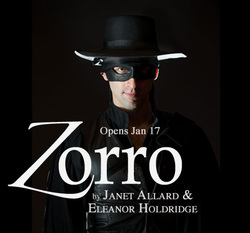 JACQUELINE LAWTON: What excited you about co-writing and directing Constellation Theatre’s production of Zorro? What made you say yes? ELEANOR HOLDRIDGE: Allison Stockman asked me what I would like to direct for Constellation. I thought about the ambitious mission of the company, as well as it’s size and history and pondered. What could both provide me with a platform for personal experimentation and growth and also fulfill the heart of Constellation’s mission? And so it was not really my director-self who responded to the challenge, but my fledgling writer self. There, in my back pocket, was this Zorro—a play that I’d conceived of several years ago, enlisted the brilliant Janet Allard to be my co-writer, and had been developing in fits and starts over several years. After several developmental workshops, the play was in the place where it was ready for rehearsal and the development that only a rehearsal process can provide. I wanted to be the first director of the piece so that I could hone the arc of the story and integrate the lessons of staging such an adventure into the text itself. And, on top of it all, I’d just worked with the DC actor Danny Gavigan and saw in his wild talent, amazing versatility, his depth and his bearing, something that spoke to both sides of the Diego/Zorro mask. And so, with all these factors in play—when Allison had read the play and wanted to do it, I said yes. Here was the chance to develop the play into what Janet and I hope it will become. JL: Can you talk a bit about your directing process? For instance, what is the first day like for you and the cast? Do you engage in certain exercises or rituals throughout the process? If so, what are they? EH: Over the past few years as a teacher of directing, I have had to analyze how I approach plays and what it is to be a director. What does it mean? What is my responsibility to the audience, to the company and to the community? And it’s tricky because each play is a completely unique synthesis of text, actors, designers, venue and the audience. For each play the aims are different and the tools to forge a production from a text are different. Therefore, the answer the question is “no.” There are no certain exercises or rituals throughout the process. If there are any constants from play to play it is in the constant investigation on what are the goals of the particular play, the work with the design team to find a world that can allow the story and action of the play to live and the creation of a collaborative rehearsal environment where the actors can respond with joy and energy to the text and each other to forge the moment to moment life of the play. JL: What is your approach to directing this play? Is it any different than it would be for a play you did not write? EH: I think the word is compartmentalization. There are times when my director self gets frustrated at my playwright self. There are times when it is the other way around. Thank god for Janet! As a director, I try always to trust the actor’s instincts in response to my worldview of the play and their impulses off of the text and each other—through collaboration we create together an integrated world. As director and co-writer, what can be most tricky are the times when I know exactly what the playwrights’ intent was in creating the stakes and the given circumstances for the characters. And then, in rehearsal, the actor sees something different in underlying objective or motivation. This can create a strange tension within me. And so when the issue comes up, I have to let the original intent go and deal only with the circumstances at hand. It is, as always, not some mythical, idealized character on the page, but the words finding their root within the heart of the individual actor, who turns them into the action of the play. This is what I must strive to honor. JL: What compelled you to co-write Zorro? EH: I can’t remember not knowing Zorro. My dad was born in 1910 (ten years old when the Fairbanks movie came out), and his phrases, stories and tall tales were filled with the purple poetic language of the pulps. I watched the movies and TV series over and over, trying to understand the more innocent childhood of my father’s youth. The myth of Zorro on the screen was always of a simpler time, of an idealistic hero who spurns his own wealth and privilege to help the poor. And, it was Diego’s relationship with his father that drew me most, the need to prove himself and be worthy of his dad’s sense of honor even while he repudiated his father’s acceptance of a corrupt society. As I was trying to figure out who I’d be in the world so, it seemed, was Zorro. Year’s later I was working on an opera in the hills of California, thinking about my father, looking out over the scrubby landscape and suddenly the image of Zorro sprang to mind. I suddenly saw in the myth of Zorro a coming of age story about how we become who we are. I sought to create an origin story for the masked vigilante. How the masks that we all wear give us strength to become what we need to be as well as trapping us within the expectations of others. A story for today. Janet Allard and I had been to graduate school together, worked on countless plays and I have always been a huge fan of her work. There’s a contemporary edgy way she has of conceiving character and turning a phrase, even while she honors and celebrates the best of what it is to be human. And so, I asked her if she’d co-write the piece with me. Wonderfully, she said yes. JL: What was the co-writing process like? EH: It is a blast. Fun. Crazy. Filled with joy. There is both the fun of sitting alone in front of the keyboard inventing of story and arc and dialog, and the wonderful sense of play and collaboration of bouncing those ideas off a partner. I am honored to be working with someone who has such wonderfully quirky sense of the world, who has such humor, wit and linguistic vigor. Janet’s brilliance is inspiring. And, I suspect it will make me a better director at the end of it all. 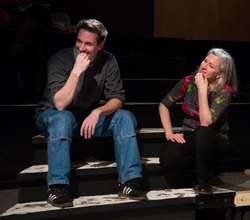 JL: What was the most challenging part of bringing the story of Zorro to life? Which character’s voice or situation was the most difficult to capture for the stage? EH: In the original pulp, many of the characters, however comic or thrilling, were like cardboard cutouts, as two-dimensional as the cheap pulp paper on which they were printed. For instance, Lolita, Don Diego’s love interest, was presented as simply a prize to be won, not a living, breathing girl struggling to find her own voice within a society that marginalizes women. And so we strove to forge her into a heroine for today. Also, the characters of Ramon and Gonzales seemed to come off in the pulp as simply an arch-villain and buffoon. For all these secondary characters there was action, but not a lot of backstory or depth. And so as Janet and I continued to send drafts to each other we undertook various passes at the script to imbed stakes and complicated history and objectives into the scenes. Janet took on Gonzales, imagining him as the guy who used to protect the weak from bullies on the schoolyard, and then joins the military service only to find out that he is forced to become a bully himself, trapped in the job as he needs to support his family. I took on the character of Ramon, imagining him not just as a villain, but as a self-made man who sees in the power-hungry Governor a father figure, who carries deep prejudices against the privileged class and who loves so deeply and obsessively that it threatens to destroy all around him. As we continue to work on the play, it is our aim to bring forth characters of complexity that, in the midst of a hero story, grapple with a complicated world. 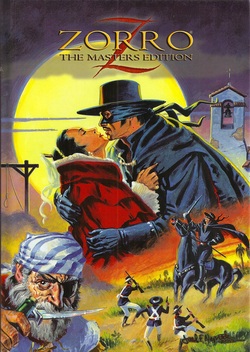 JL: Johnston McCulley created Zorro in 1919 as part pulp-fiction series. What makes this story of romance, heroism and adventure relevant to audiences? EH: Johnston McCulley created a simple world of good versus evil—a tale of bravery and the daring of one man in the face of an unexamined evil. Today our country’s all grown up. We examine the forces behind the evil and the good. We live in a world of incredible complexity even while we long for stories of heroes who stand against all odds to make the world a better place. Why? I think that at the core of the entertainment is our desire to be inspired. It is easy to accept the circumstances handed to us by our parents, our government, and our society and to say, “well that’s just how things are.” But this is an origin story in which we celebrate the individual’s choice to act and make a difference. In witnessing a reluctant hero who sees a wrong, faces his individual responsibility, makes the choice to right those wrongs and bravely faces the consequences of his actions, I believe we can be inspired to do so ourselves. JL: What next for you as a director? Where can we follow your work? EH: Come see Yasmena Reza’s God of Carnage at Everyman Theatre in Baltimore running March 13 to April 7th. And I may try my hand at some more adaptation. 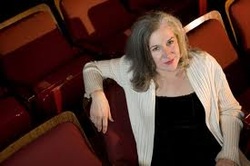 Director, Eleanor Holdridge has Off-Broadway productions that include Steve & Idi, (Rattlestick Playwrights Theatre), Cycling Past The Matterhorn(Clurman Theatre), The Imaginary Invalid, and Mary Stuart (Pearl Theatre Company). Regional credits include Gee’s Bend (Arden Theatre); Hamlet, Midsummer Night's Dream, As You Like It, Lettice And Lovage, The Tempest, Twelfth Night, Taming Of The Shrew(Shakespeare & Company). The Crucible (Perseverance Theatre), Educating Rita, Noises Off and Art (Triad Stage), Julius Caesar and Macbeth (Milwaukee Shakespeare), Two Gentlemen Of Verona (Alabama Shakespeare), Midsummer Night's Dream (Shakespeare St. Louis), Henry V (Shakespeare on the Sound), Betrayal (Portland Stage), and Lion In Winter (Northern Stage). Her DC area productions include Double Indemnity(Roundhouse Theatre),The Gaming Table (Folger) Pygmalion (Everyman Theatre);Something You Did and Body Awareness (Theatre J); and Much Ado About Nothing(Taffety Punk). Eleanor has been as Artistic Director for the Red Heel Theatre Company, Resident Assistant Director at the Shakespeare Theatre and Resident Director at New Dramatists. She has worked at the Yale School of Drama, NYU and the Juilliard School and currently heads the Directing Department at Catholic University. She holds an MFA from Yale School of Drama. Eleanor’s upcoming projects this season are Zorroat Constellation Theatre, and God of Carnage at Everyman Theatre. 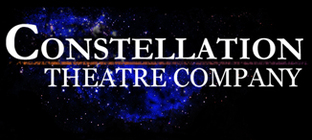 PRODUCTION DETAILS WHO: Constellation Theatre Company WHAT: Zorro by Janet Allard and Eleanor Holdridge. Directed by Eleanor Holdridge WHERE: Source Theatre 1835 14th St. NW WHEN: January 17- February 17, 2013. OTHER: Audiences aged 10 and up. A parent or guardian should accompany any child under 13. WEBSITE: www.ConstellationTheatre.org Constellation Theatre Company Mission: Constellation Theatre Company’s mission is to spark the curiosity and imagination of the people of Greater Washington, DC by bringing stories to life from all over the world. Visual spectacle, music and movement unite with an exuberant acting ensemble to create an exhilarating entertainment experience.
0 Comments
Your comment will be posted after it is approved.
Leave a Reply. |
My BlogI'm a playwright, dramaturg, and teaching artist. It is here where you'll find my queries and musings on life, theater and the world. My posts advocate for diversity, inclusion, and equity in the American Theatre and updates on my own work. Please enjoy!
Categories
All
Archives
June 2020
Reading List
|
